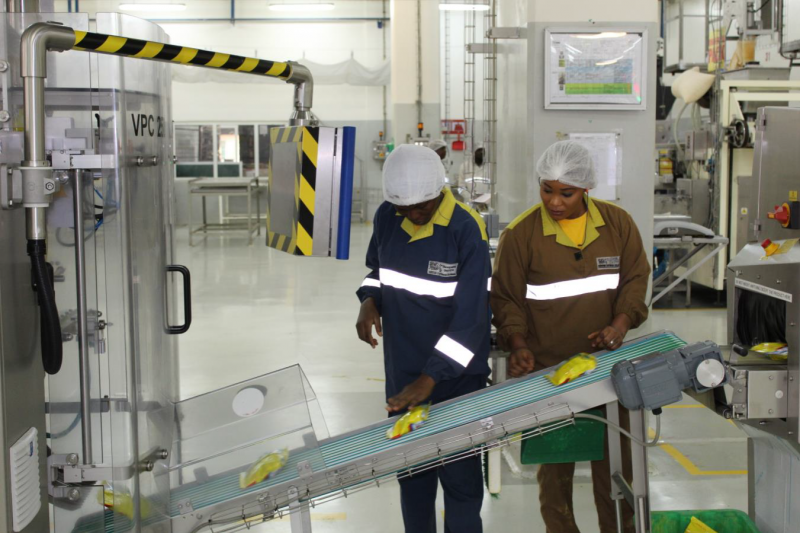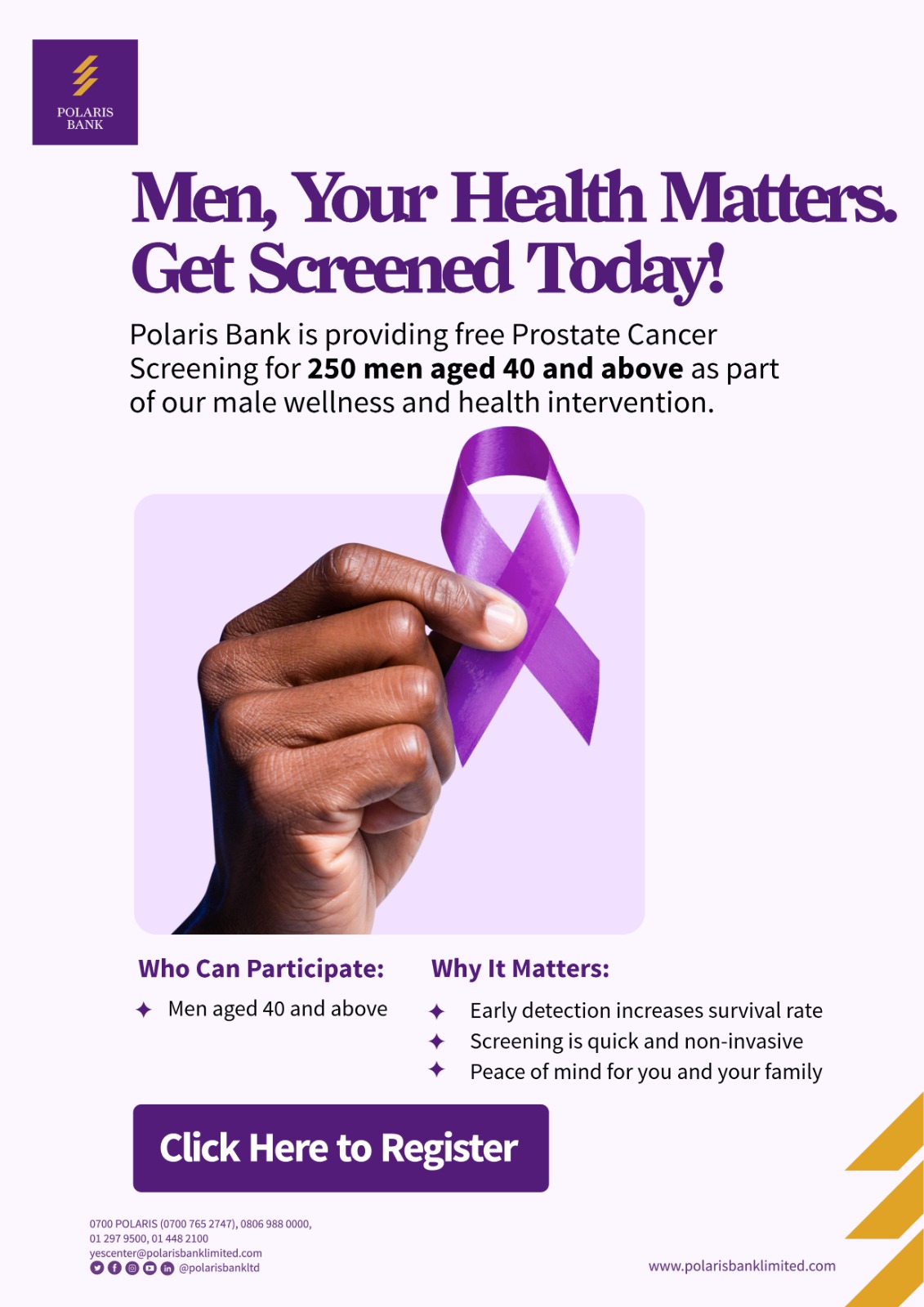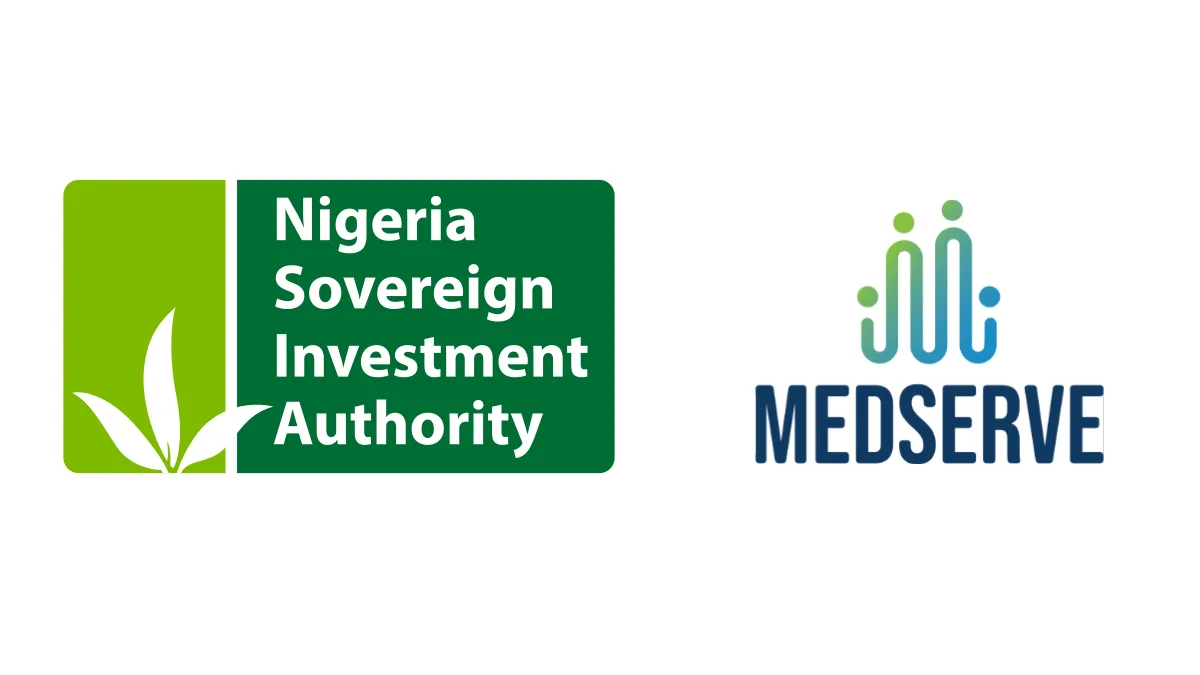Health
More Women in Workplace Boosts Performance—Nestle

By Dipo Olowookere
World’s largest food and beverage company, Nestlé, has launched an ambitious Gender Balance Acceleration Plan called From Aspiration to Action as part of its activities to highlight International Women’s Day 2019.
The firm says it believes that a gender balanced workforce makes business sense as it helps to boost innovation and performance, which as a result, better serves the needs of its consumers.
Nestlé’s Global CEO Mark Schneider announced the company’s acceleration plan to make gender balance a priority, based on three pillars: bold leadership, an empowering culture and a set of enabling practices.
In the Central and West Africa Region (CWAR), Nestlé aims to bring the Gender Balance Acceleration Plan to life through its multi-pronged initiatives, such as trainings to raise awareness on gender biases, career development and mentoring programmes for women, gender-sensitive succession planning, offering breastfeeding rooms and nurseries at work, as well as the implementation of its Maternity Protection Policy.
Driving innovation
At Nestlé CWAR, increasing the number of women in the workforce and boosting gender balance is helping to drive innovation.
Bunmi Etty-Mfon, Total Performance Management Manager for Technical at Nestlé CWAR, who has led factory efficiency for over eight years to deliver safe, quality products in Nigeria, Ghana, Senegal, Cameroon and Côte d’Ivoire, has encouraged and experienced this herself.
“When there’s a good mixture of men and women, team-building activities tend to be more balanced, helping to develop greater empathy among individuals and teams. Diversity stimulates greater effort from everyone, leading to improved decision-making.
“Also, as the majority of consumers in our region are women, it gives us great perspective to lead in innovation,” she said.
Rahamatou Palm, Category Manager for our Nescafé business in Burkina Faso, Mali, Niger, Togo and Benin – and a member of the Cluster Management Committee of which half are women – agrees that diversity is key for the company’s growth.
“Gender balance is important to complement the thinking between men and women, leading to more productive debates and innovative decisions. It also fights against discrimination to ensure a better, and more dynamic workplace,” she emphasised.
Improving the company’s performance
Nestlé CWAR is also actively enhancing the company’s performance by increasing the number of women in departments that traditionally hire men.
To close the current gender gap, the Technical and Supply Chain Management departments are looking to recruit a majority of women as graduate trainees, and include at least one female candidate in the final interview stage. Efforts are also being made to increase the number of women working in factories across the region.
Ibukun Ipinmoye, Factory Manager of the Flowergate Factory, which includes the first 100% female production line in Nestlé Nigeria, has noted an increase in productivity.
“We soon realised that the female production lines are very productive thanks to their highly committed and collaborative spirit and their careful handling of the equipment. Gender diversity has helped to boost productivity,” he said.
“As a result, we plan to introduce female operators to more complex lines to utilise their multitasking skills, and aim to hire female management trainees to 80%.”
Gbenga Oladunjoye, Factory Manager for Nestlé Ghana, has also seen improved performance in his team.
“My team is more productive, with readily available good talent and a wide diversity of ideas. Women have helped to ignite creativity, offered various perspectives and improved our business,” he said.
Gbenga, who oversees the Tema facility and is part of the Country Management team, added: “They mostly make the decisions to buy products for their families so having women at Nestlé makes business sense.”
Overcoming biases
However, creating gender balance on the factory floors or in offices does not come without some obstacles. Pressure to conform to gender stereotypes, resistance from men, adapting work patterns to family life and maternity commitments, and the shortage of females in certain fields like engineering, are just some of the gender balance challenges that working women face.
Julia Atta, Production Manager for Milks in Nestlé Ghana, was appointed as the first female production manager for Nestlé CWAR last year – marking a milestone for the company in the region.
She explained that she went into this ‘non-traditional’ line of work for women to change mind-sets and make an impact. But this came with its challenges.
“For any women in a male-dominated environment, even a genuine reason can become a woman’s excuse. For example, I felt I had to turn down an opportunity to go into production because I got pregnant, even though factory management made me an offer. At the time, I was unsure it was the right decision to join, as production was not seen as an ideal environment for my ‘condition’,” Julia said.
“Thanks to the support of management, I had another opportunity to take up a role outside of the country for five months. However, others made me feel like I had made the wrong decision to leave my young child behind – but I was determined to make it work.”
Today, Julia heads the milk production and technical team, leading the production, quality, safety, cost and delivery of 130 tonnes of evaporated milk a day, while also developing her team of junior and senior employees.
Women leaders inspiring other women
Creating a solid pipeline of female talent across all levels enables more women to climb up the career ladder to top positions, which has a ripple effect of encouraging other women to achieve their goals.
“Being a career woman is never a burden or added responsibility, but a platform to inspire and motivate the people you are lucky enough to impact,” Julia continued.
“When a woman is appointed in a leadership role, some people believe this is because of a gender balance strategy and not based on merit. It must be based on non-discrimination, equal opportunities, competence and providing the right support for both men and women in the workplace. This is how we will be genuinely able to highlight and remove the roadblocks to career advancement at work,” she added.
Gbenga Oladunjoye, Factory Manager at the Tema facility in Nestlé Ghana, emphasised that women at Nestlé inspire other women to follow suit, and said: “They enhance inclusiveness, advance opportunities and give hope to women worldwide that they can achieve the same too.”
Building a strong pipeline of talent is key to gender balance
Embracing diversity and increasing the number of women in leadership roles and in the workforce all make business sense at Nestlé CWAR – and for the company worldwide. This is part of its commitment to enhance gender balance in its workforce and empower women across the entire value chain.
But this just doesn’t stop here. To help achieve this across the board, organisations need to build a solid and balanced pipeline of talent and invest in women’s education and training to create and instil diversity at all levels, and in all functions.
“We recognise that gender balance, women’s rights, education for women and women’s empowerment are critical to Creating Shared Value– our approach to how we do business in creating value for both our shareholders and for society,” said Rémy Ejel, Market Head for Nestlé CWA Ltd.
“It is also key to contributing to Sustainable Development Goal 5: Achieve gender equality and empower all women and girls – and we encourage other companies to also make gender balance a priority,” Mr Ejel concluded.
Health
Polaris Bank Sponsors Free Breast, Prostate Cancer Screenings

By Modupe Gbadeyanka
To commemorate World Cancer Day observed on Wednesday, February 4, 2026, Polaris Bank Limited is bankrolling free screenings for breast and prostate cancers across the country.
The financial institution partnered with a non-governmental organization (NGO) known as Care Organization and Public Enlightenment (COPE) for this initiative.
At least 100 women would be screened during the exercise, scheduled for Saturday, February 21, 2026, at the C.O.P.E Centre on 39B, Adeniyi Jones Avenue, Ikeja, Lagos, from 10:00 am to 2:00 pm.
The exercise will be conducted by trained health professionals and volunteers, ensuring participants receive both screening services and educational guidance on cancer prevention, self-examination, and follow-up care.
To participate in the free breast cancer screening programme, the applicants must be women, must be Polaris Bank account holders, and must have registered ahead of the day via bit.ly/BCS2026, with selection based on early and confirmed submissions.
Polaris Bank said the initiative was designed to promote awareness, screening, early detection, and preventive care, reinforcing its belief that access to health services is a critical foundation for individual and economic well-being.
The organization is already supporting an on-going free prostate cancer screening programme for 250 men aged 40 years and above across Nigeria.
The prostate cancer screening is being conducted at the Men’s Clinic, situated at 18, Commercial Avenue, Sabo, Yaba, Lagos, providing accessible, professional medical support for male participants seeking early detection and preventive care for prostate cancer.
Both initiatives (free breast and prostate cancer screenings) directly aligns with the United Nations Sustainable Development Goals, particularly SDG 3 (Good Health and Well-being) through improved access to preventive healthcare and early detection services, SDG 5 (Gender Equality) by prioritizing women’s health and empowerment, and SDG 17 (Partnerships for the Goals) through strategic collaboration with civil society organizations such as C.O.P.E to deliver community-centered impact.
Educational materials, community engagement sessions, and digital awareness campaigns will be deployed to reinforce key messages around early detection, lifestyle choices, and the importance of regular medical check-ups.
The Head of Brand Management and Corporate Communications for Polaris Bank, Mr Rasheed Bolarinwa, emphasised that early detection remains one of the most effective tools in the fight against cancer.
Health
NSIA Gets IFC’s Naira-financing to Scale Oncology, Diagnostic Services

By Adedapo Adesanya
International Finance Corporation (IFC), a subsidiary of the World Bank, and the Nigeria Sovereign Investment Authority (NSIA) have partnered to provide Naira-denominated financing to NSIA Advanced Medical Services Limited (MedServe), a wholly owned healthcare subsidiary of the country’s wealth fund.
Supported by the International Development Association’s Private Sector Window Local Currency Facility, this financing enables MedServe to scale critical healthcare infrastructure while mitigating foreign exchange risks. IFC is a member of the World Bank Group.
The funds will support MedServe’s expansion program to establish diagnostic centers, radiotherapy-enabled cancer care facilities, and cardiac catheterisation laboratories across several Nigerian states.
These centres will feature advanced medical technologies, including CT and MRI imaging, digital pathology labs, linear accelerators, and cardiac catheterisation equipment, thereby enhancing specialised diagnostics and treatment.
MedServe provides sustainable service delivery with pricing that matches local income levels, helping ensure broader access to affordable oncology care for low-income patients.
The initiative will deliver over a dozen modern diagnostic and treatment centers across Nigeria, create 800 direct jobs, and train more than 500 healthcare professionals in oncology and cardiology specialties.
The total project size is $154.1 million, with IFC contributing roughly N14.2 billion ($24.5 million) in long-tenor local currency financing, marking IFC’s first healthcare investment in Nigeria using this structure.
This comes as Nigeria advances its aspirations for Universal Health Coverage. This partnership provides an opportunity to leverage private investment to complement government efforts to expand oncology care and diagnostic services.
IFC’s provision of long-tenor Naira financing addresses a significant market gap and unlocks institutional capital for healthcare infrastructure with strong development upside while MedServe’s co-location strategy with public hospitals maximises capital efficiency and strengthens the public-private ecosystem, establishing a replicable platform for future investment.
“This partnership with IFC represents a significant milestone in NSIA’s commitment to strengthening Nigeria’s healthcare ecosystem through sustainable, locally anchored investment solutions,” said Mr Aminu Umar-Sadiq, managing director & chief executive of NSIA.
He added, “By deploying long-tenor Naira financing, we are addressing critical infrastructure gaps while reducing foreign exchange risk and ensuring that quality diagnostic and cancer care services are accessible to underserved communities. MedServe’s expansion underscores our belief that commercially viable healthcare investments can deliver strong development impact while supporting national health priorities.”
“This ambition is consistent with our broader vision for Africa, one where resilient health systems and inclusive growth reinforce each other to deliver long-term impact across the continent,” said Mr Ethiopis Tafara, IFC Vice President for Africa.
Health
Lagos Steps up Mandatory Health Insurance Drive

By Modupe Gbadeyanka
Efforts to entrench mandatory health insurance through the Ilera Eko Social Health Insurance Scheme in Lagos State have been stepped by the state government.
This was done with the formal investiture of the Commissioner for Health, Professor Akin Abayomi, and the Special Adviser to the Governor on Health, Mrs Kemi Ogunyemi, as Enforcement Leads of the Lagos State Health Scheme Executive Order and ILERA EKO Champions.
The Commissioner described the recognition as both symbolic and strategic, noting that Lagos is deliberately shifting residents away from out-of-pocket healthcare spending to insurance-based financing.
“We have been battling with how to increase enrolment in ILERA EKO and change the culture of cash payment for healthcare. Insurance is a social safety net, and this mindset shift is non-negotiable,” he said.
He recalled that Lagos became the first state to domesticate the 2022 National Health Insurance Authority (NHIA) Act through an Executive Order issued in July 2024, making health insurance mandatory. He stressed that the decision reflected the Governor’s strong commitment to healthcare financing reform, adding, “When Mr. Governor personally edits and re-edits a document, it shows how critical that issue is to the future of Lagosians.”
Mr Abayomi also warned against stigmatisation of insured patients, describing negative attitudes towards Ilera Eko enrolees as a major barrier to uptake. “If someone presents an Ilera Eko card and is treated as inferior, uptake will suffer. That must stop,” he said, pledging to prioritise insurance compliance during facility inspections. “The key question I will keep asking is: ‘Where is the Ilera Eko?’”
In her remarks, Mrs Ogunyemi, said the enforcement role goes beyond a title, stressing that the health insurance scheme is now law.
“This is about Universal Health Coverage and equitable access to quality healthcare for everyone in Lagos State,” she said, noting that ILERA EKO aligns with the state’s THEMES Plus Agenda.
She commended the Lagos State Health Management Agency (LASHMA) for aggressive sensitisation efforts across the state, saying constant visibility was necessary to address persistent gaps in public knowledge. “People are still asking, ‘What is Ilera Eko?’ ‘Where do I enrol?’ Those questions tell us the work must continue,” she said.
She urged all directors and health officials to mainstream Ilera Eko promotion in every programme and engagement, emphasising that responsibility for health insurance advocacy does not rest with LASHMA alone. “When people come with medical bills, the first question should be: are you insured?” she said, adding that early enrolment remains critical as premiums rise over time.
Earlier, the Permanent Secretary of LASHMA, Ms Emmanuella Zamba, said the investiture marked a critical step in positioning leadership to drive enforcement of the Executive Order across the public service.
“What we are undertaking is pioneering in Nigeria. All eyes are on Lagos as we demonstrate how mandatory health insurance can work,” she said.
Ms Zamba disclosed that enforcement nominees across Ministries, Departments and Agencies have been trained, with a structure in place to ensure compliance beyond the health sector.
According to her, “This initiative cuts across the entire public service, particularly public-facing MDAs, in line with the provisions of the Executive Order.”
She explained that the formal designation of the Commissioner and the Special Adviser as Enforcement Leaders was meant to strengthen compliance, alongside the Head of Service, while also recognising their consistent advocacy for universal health coverage. “This decoration is to amplify their roles and appreciate the leadership they have shown,” she said.
-

 Feature/OPED6 years ago
Feature/OPED6 years agoDavos was Different this year
-
Travel/Tourism9 years ago
Lagos Seals Western Lodge Hotel In Ikorodu
-

 Showbiz3 years ago
Showbiz3 years agoEstranged Lover Releases Videos of Empress Njamah Bathing
-

 Banking8 years ago
Banking8 years agoSort Codes of GTBank Branches in Nigeria
-

 Economy3 years ago
Economy3 years agoSubsidy Removal: CNG at N130 Per Litre Cheaper Than Petrol—IPMAN
-

 Banking3 years ago
Banking3 years agoSort Codes of UBA Branches in Nigeria
-

 Banking3 years ago
Banking3 years agoFirst Bank Announces Planned Downtime
-

 Sports3 years ago
Sports3 years agoHighest Paid Nigerian Footballer – How Much Do Nigerian Footballers Earn












